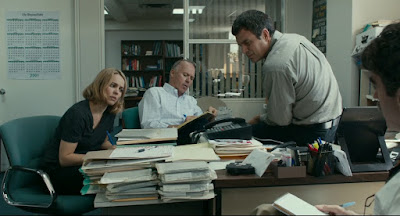Nov 11, 2015
Spotlight
Spotlight, directed by Tom McCarthy and co-written by him and Josh Singer, is less about child abuse than it is about hard work. It's about how journalists at The Boston Globe, after years of burying the story, finally investigated claims of the massive molestation of children by Catholic priests in Boston, with the complicity of Boston's Cardinal Law.
There is barely a child in sight. There are no teary scenes with outraged parents. Better yet, there are no scenes of abuse, just the powerful, uncomfortable retelling of it. The victims are in the periphery of life, muted, forgotten. Once in a while they come back as adults to demand to be heard. The way in which they are shrouded by hurt is evidence enough of their torture at the hands of the priests who raped them.
Conceptually, the movie frames the story within the same opacity and obfuscation the journalists encounter when dealing with claims of child sexual abuse by members of the clergy. No one wants to know. No one wants to believe that priests are capable of such depravity. Several times we learn that people (lawyers, victims) shared this information with the Globe and it was buried in some neglected newspaper section that no one ever reads. Such is the depraved arrogance of the Church, and its confidence on its own unquestioned power, that it can operate a ring of pedophiles in plain sight for years, shuffling criminal priests off to different parishes, never prosecuting or punishing them, and then quietly settling with the victims for a pittance.
Spotlight is not an emotionally dramatic movie. It is a procedural. It accumulates a quiet outrage as it churns out the finding and corroborating of evidence. Spotlight is also not a visually exciting movie. It is shot in muted tones and looks and feels like an old-fashioned TV show. But it is gripping in its steady and clear narrative.
The stellar cast seems to have been instructed to rein in any kind of histrionics, except for a moment when journalist Mike Resendez (Mark Ruffalo) loses his cool as his boss (Michael Keaton) decides not to publish just yet. Otherwise, they just work their butts off every day to get closer to the truth.
Liev Schreiber (so nice to see him playing a mensch), is quietly impressive as Marty Baron, the new editor of the Globe, an outsider who wonders why this story has not been followed. He is not Catholic, he is not from Boston and he doesn't care that no one messes with the Catholic Church.
The actors are all solid, from Rachel McAdams, John Slattery (incapable of not being droll, but it works), Brian D'Arcy James, Stanley Tucci, Len Cariou as Cardinal Law and Paul Guilfoyle, a standout, as the Church's hatchet guy. Especially powerful is Neal Huff as a victim who refuses to let it go.
If I have nitpicks, is that no one bothered with the Boston accent and that there may be a couple of unnecessary scenes that explain too much. But there are many nice touches. The way the beleaguered victims' lawyer Mitch Garabedian (Stanley Tucci) chirps up, but only when he speaks to children. The way court clerks, judges, lawyers, relatives of the priests instinctively close ranks the minute someone comes snooping is the chilling portrayal of a day to day conspiracy, made more sinister by the fact that everyone in Boston seems to be in on it.
Investigative dramas tend to tug at our heartstrings by parading the victims and giving them their day, trying to assuage our sense of redress. Here, there is no redress. Most offending priests and their powerful enablers have never been prosecuted. There is no happy ending. Since the movie doesn't focus directly on the suffering of the victims, their plight resonates more strongly in our imagination. What breaks the heart is the shroud of indifference that engulfs these people, who live their lives with terrible burdens and secrets that the police, the press, their communities, their church, even their parents - refuse to acknowledge. One is revulsed by are the arrogance of impunity, the strong arm tactics, the sadistic refusal of the Church to put an end to this problem. Not to mention the fact that the offending priests preyed on the most vulnerable children from impoverished, broken homes.
Even the journalists have to deal with some soul searching of their own as to why the Globe never really pursued the claims when they first appeared. I wish the movie had given more weight to this, which centers on the editor of the Spotlight section of the paper, Walter "Robby" Robinson (Michael Keaton), but it refrains from turning into a blame game. Spotlight goes out of its way not to tarnish the sad legacy of the victims' stories with cheap drama. Its power is that it points to the evil of indifference, denial and acquiescence, implying that everyone who turns a blind eye is guilty, as to the evil of the abuse itself. It's the kind of movie that gains in stature the more you think about it.
Subscribe to:
Post Comments (Atom)

No comments:
Post a Comment